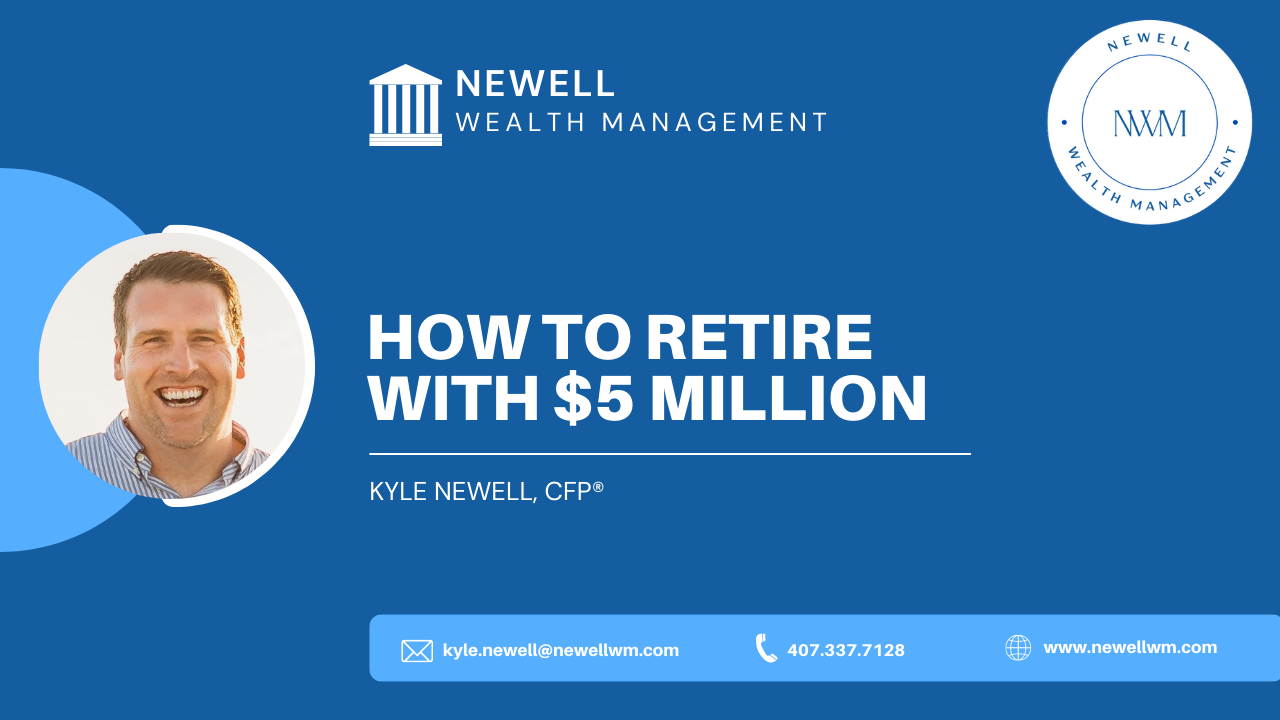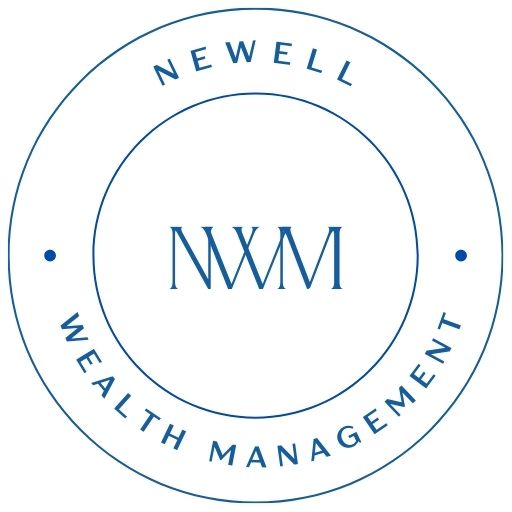How to Retire with $5 Million

When you’re approaching retirement and thinking about retirement planning, how much money you have is a crucial factor. A plan to retire with $5 million directly impacts the type of retirement you can have and how you should think about achieving it.
Depending on your age, there are some additional things to consider to retire with $5 million. Retiring before 59 ½ or after is an important one. In addition, there are some essential things many people just don’t think about when it comes to retirement planning. Let’s focus on the key elements to consider if you plan to retire with $5 million.
What Does Your Ideal Retirement Lifestyle Look Like?
As you look to transition into retirement, you may wonder how to do it. This is the first thing you should ask yourself when planning for retirement. If you plan to retire with $5 million, you’ve saved and invested well.
Clients often go straight to the topics of strategies, taxes, etc. Those are valuable things to consider. However, it’s vital to envision what retirement looks like for you.
Ask yourself
- What’s the reason I want to retire?
- What does your ideal outcome look like?
- What does your ideal retirement lifestyle look like?
The answers to these questions will drive your strategy and decision-making.
You may want to be able to travel the world regularly and take amazing trips throughout your retirement. That’s great! Your strategy will be very different from those who want to stay home, read books, and do some gardening.

Everyone wants something different in retirement. Different people like different things.
The cost of your retirement lifestyle includes necessities or what you must pay for. It also includes things you want to pay for. You’ve worked your whole life. Retirement is when you get the time to enjoy it. You want to use the money you’ve saved to live the lifestyle that you want.
What does being able to retire with $5 million look like for you?
Additional Costs in Retirement
Next, consider the additional costs of retirement. Before retirement, you’re used to living, working, and having certain expenses. However, once you retire, there are some additional costs that you need to consider.
Healthcare
Healthcare is paramount to retirement planning. You should plan for various phases of retirement healthcare at the beginning and throughout retirement, and also aging care toward the end of life. Healthcare costs are not insignificant and can be substantial.
Retiring Before Age 65
Health care costs before the age of 65 are slightly different than after when you are eligible for Medicare. Your costs will greatly depend on the type of coverage you have.
For example, does your previous employer offer ongoing health care benefits? What are the costs and coverage options?
If not, what are your healthcare options, coverages, and costs? Some options include
- Affordable Care Act Exchanges (Obamacare)
- Sharing plans
- Part-Time Work
Sharing plans are similar to insurance in some regards but should not be considered an insurance plan. They may come at a lower cost but involve more significant financial risk.
Some retirees want to find part-time work at a company they enjoy. Often they have been customers of the company. At this stage, it may not even feel like work to you.
A friend of mine loves to go to Lowe’s. Part of his retirement plan includes retiring early, in his mid-50s. He’s calling it retirement, but he’s just transitioning to a role at Lowe’s that he feels would be fun to do and not feel like work.
There are lots of options when it comes to healthcare costs before 65. Each has pros and cons to consider.
Retiring At 65 or After
At this point, you will be on Medicare. Medicare has all different sorts of components to it. There are traditional Medicare and Medicare Advantage plans. Each also has pros and cons and will cover certain healthcare costs.
Learn the aspects of Medicare and the various plans to help you create the best financial strategy for retirement.
Aging
One often overlooked topic that is vital is the cost of aging. Remember, when you retire, you are no longer working. Being able to retire with $5 million is an admirable goal. The key is to not run out of money before the end of life.
No one wants to think about getting older and reaching the end of life. Nonetheless, it’s a reality. Don’t overlook it.
Statistics show the odds are relatively high that one will need some sort of long-term care. Of course, that varies wildly on what that constitutes, but basically, it means you need help. You may need help
- Around the house
- Getting to the restroom or out of bed
- Cooking and cleaning
- With cognitive issues
These care costs can be substantial as you age, depending on your area and what type of care you want or need.
Think through the costs of care and what you would ideally like. Don’t just think about the fun things in retirement. Plan for the uncomfortable ones like the end of life as well.
Taxation of Retirement Income
You’ve saved and invested to retire with $5 million. Your ideal retirement lifestyle is defined. You’ve added in the health care and additional costs in retirement. Now look at how the taxes are going to work.
Much of taxation depends on how your assets are situated and where the income will come from. You may have a pension which will most likely be taxable as ordinary income. If you have Social Security, some of it may be taxable. Some may not.
401k or IRA income will be taxed differently than a Roth 401k or Roth IRA. There’s also your taxable account, such as company stock from along the way.
Many of my clients work for Disney. They own Disney stock they’ve invested in along the way that ends up being a substantial part of their net worth. The taxation of that stock is different than their 401k, for example.
Owning company stock within your 401k also has different taxation rules. Disney stock can be treated differently than other funds in the account. There are some special tax rules around company stock in a 401k that you’ve got to be careful with. Understanding the taxation of your income sources can prevent financial problems as you go through retirement.
Let’s say you need $150,000 a year in income. You will have to take out more than $150,000 from your accounts if they, combined with your savings, are the sole sources of your income due to taxation.
Trying to minimize those taxes and save yourself as much money as possible is a prudent thing. Think about taxes now and later to balance your overall tax costs. Don’t just look at the immediate year, but also look forward over the next 5, 10, 20, or 30 years. What does that look like from a tax perspective?
Estate Planning
I often hear people say they want to bounce their last check. I get the idea behind it, but the reality is that creating the perfect plan to do that is highly challenging. As you prepare to retire with $5 million, the odds are that you will have some money left over.
The reason? We never know when our time is up.
It could be today or 20 years from now. We don’t know. You want to plan for the inevitability of your passing so that whoever takes over those responsibilities can handle the burden of that wealth. That person could be your children, spouse, friend, or other family member.
Having the proper estate planning documents prepared and a plan to make the process seamless for whoever is stepping in is a priority. That process may look something like this:
- Take the estate planning documents your attorney gives you and put them in place.
- Make sure people understand who is taking over.
- Ensure the person given the responsibility understands the logistics.
I can’t tell you how often the first two steps are complete, but the third is not. Usually, the person taking over has to navigate finding things like
- Where things are located (accounts, banks, etc.)
- Who to contact
- Logins and passwords
Don’t overlook the importance of considering the logistics involved with managing the day-to-day financial picture.
The Big Picture
If you want to retire with $5 million, it’s certainly doable. Just be sure to think through your retirement plan. You should, of course, focus on the investments and income but also the bigger picture. Craft a solid plan by adding in the factors of
- Health care & additional costs
- Taxation
- Estate Planning
Seek the guidance of professionals. A smart strategy will help you achieve your ideal retirement lifestyle and what happens beyond. If you need advice and don’t have a team in place to help advise you, I’m happy to help.
Important Information
Newell Wealth Management, LLC (“NWM”) is a registered investment advisor offering advisory services in the State of FL and in other jurisdictions where exempted. Registration does not imply a certain level of skill or training. The presence of this website on the Internet shall not be directly or indirectly interpreted as a solicitation of investment advisory services to persons of another jurisdiction unless otherwise permitted by statute. Follow-up or individualized responses to consumers in a particular state by NWM in the rendering of personalized investment advice for compensation shall not be made without our first complying with jurisdiction requirements or pursuant an applicable state exemption.
All written content on this site is for information purposes only and is not intended to provide specific advice or recommendations for any individual. Opinions expressed herein are solely those of NWM, unless otherwise specifically cited. Kyle Newell and NWM are neither an attorney nor an accountant, and no portion of this website content should be interpreted as legal, accounting or tax advice. Material presented is believed to be from reliable sources and no representations are made by our firm as to other parties’ informational accuracy or completeness. There is no assurance that the views or strategies discussed are suitable for all investors or will yield positive outcomes. Investment involves risks including possible loss of principal and unless otherwise stated, are not guaranteed. Any economic forecasts set forth may not develop as predicted and are subject to change. All information or ideas provided should be discussed in detail with an advisor, accountant or legal counsel prior to implementation.
